#based on misunderstanding and or bad faith
Explore tagged Tumblr posts
Text
My most toxic opinion is that sometimes you can, and should actually, argue against a doylist analysis with a watsonian argument. It's occasionally genuinely necessary to do that.
#*louder so as to be heard over your booing* SOMETIMES YOU GUYS GET SO WRAPPED UP IN HATING YOU MAKE CRITICISMS BASED#IN FUNDAMENTAL MISUNDERSTANDINGS OF THE TEXT#*booing intensifies* SOMETIMES YOU CHERRY PICK PLOT POINTS IN BAD FAITH#SOMETIMES YOUR CRITICISMS ARE BASED IN THE IDEA THAT THE TEXT DIDN'T ADDRESS SOMETHING#THAT IT ACTUALLY ADDRESSES VERY DIRECTLY !!!!!
18 notes
·
View notes
Text
i like watching videos tearing into shows i'm never gonna watch and. i noticed a repeating element in a lot of them is that many shows dumb things down and leave nothing to subtext and have to say everything out loud, thus leaving out any air of mystery or any option for the audience to piece things together on their own
and i can't help but wonder if this is a small part of a bigger problem we see with media literacy lately. people not wanting to take the extra second to think about anything, because the way information is presented in everyday settings - through social media, mostly - is through short videos that don't *want* you to take an extra second to think, they want you to move on to the next thing as fast as possible, and they want you to feel what they need you to feel in order to agree with them.
so, this is expressed through regular media as well - no scene is allowed to ruminate in your mind. you need to binge the entire show in one or two days, so they need to fit in a lot of information in a short time. they need to keep your attention the entire time, they don't want you to get distracted by thinking too much. they need you to feel what they want you to feel, so they just straight up tell you what it is.
maybe i'm just reaching, but. i think there's a case to make here
[also mandatory disclaimer: ik there's also a lot of good media these days! ik my view is skewed here bc i purposely watch videos about the *bad* media. however, what i'm looking to highlight here is less "look how bad media is today" and more "bad media today is bad in this specific way and that wasn't always the case".
and ofc i say "people" but i don't blame individuals here (well, maybe only a little), ik this media literacy issue is purposely designed by corporations who want you as enraged as possible and as engrossed in their content as possible so they can show you more ads. and look at me explaining things literally instead of letting you make these connections yourself too. damn. sorry]
#abt that last part. tbf. i've been on tumblr for years ik ppl misunderstanding you in ridiculous ways is bound to happen#so i'm just covering my bases here :P tho i do trust most ppl to not read this in bad faith. but. jic 🫡
8 notes
·
View notes
Text
Man, those schmaltzy movies about autistic people that are really about the struggles their neurotypical parents go through are already hella insulting, but this new movie The Unbreakable Boy especially pisses me off cuz it's based on an autobiography meaning that it's both an insult towards an actual autistic person and also shows just how shitty the guy who wrote said autobiography is as a person
#autism#actually autistic#rant#vent#the fact it's a faith based movie makes it worse#if there's anyone who misunderstands autism just soooo bad it's religious zealots#also I'm not at all surprised the irl dad supports autism speaks and they gave his book an award#I'm so tired of this shit#i know it's already been said but it feels especially pointed that they played it before sonic 3#like they're trying to pander to autistic people#even tho if they had two braincells to rub together they'd know autistic people would hate it
2 notes
·
View notes
Text
hey, op here! just wanted to chime in real quick and say that, while everyone is entitled to believe whatever they want, with the first quote i didnt mean god in the religious sense, but rather, as if 'god' was the universe itself. im not religious by any means (im athiest) and it's not what the intended meaning behind this post was but i acknowledge that others might interpret it differently because of the first quote (which is also the one and only quote that even says the word god but i digress) if you personally dont relate to the quote thats fine!
in short--its not about god. and sure, thats not explicitly stated in the post but to say that this entire post is attributing all the wonders and beauty and chaos of existence is thanks to The God, and not just a post simply about the beautiful chaos of living and how much someone finally doesnt want to die and would rather live, is a bad faith interpretation of the post at best
my own personal meaning/reasoning for this web weave is under the cut
simply, i made this because--as someone who isnt religious--i struggle a lot with the concept of death and the idea of the absence of living
im not going to go into the extent to which i obsess over it, and how it affects my day to day life, but my intention with the quotes i picked out is because they captured how, for the first time in my life, i dont want to die and actually quite enjoy living despite whatever pain there is
it probably wouldve been a lot simpler to keep scrolling if you didnt like/relate to the post based on how you interpreted it. hope this helps!

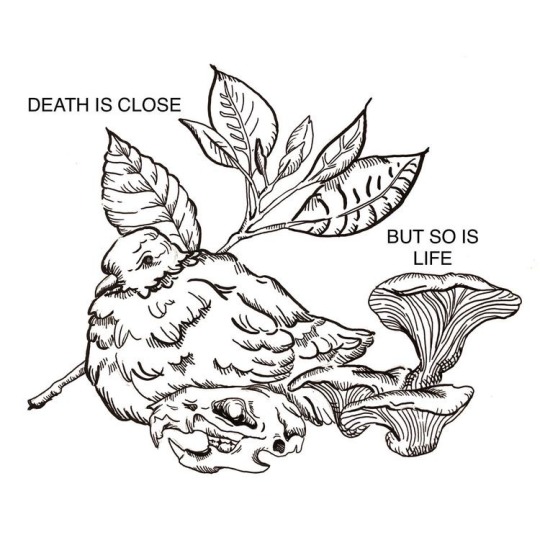


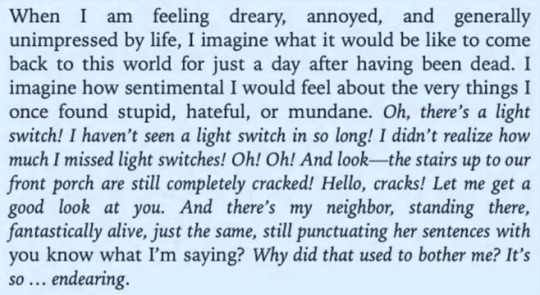

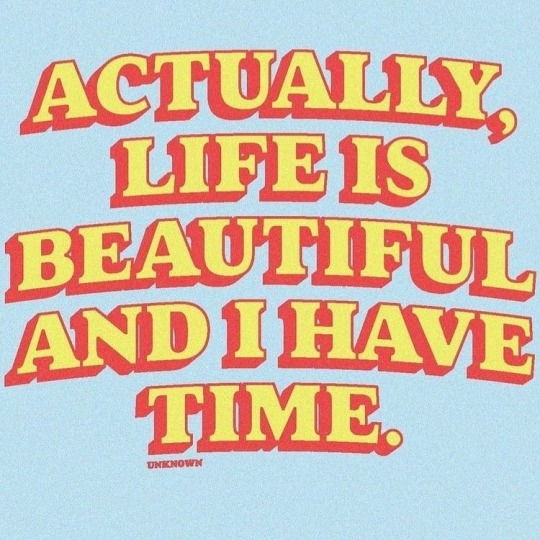

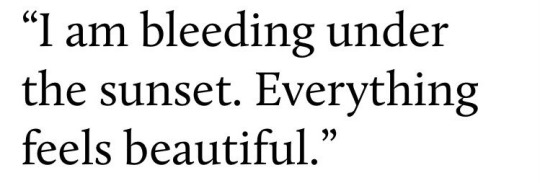
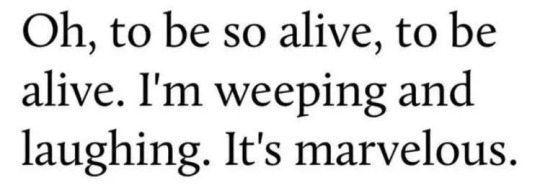
i am too in love with life, i don't want to die (i cannot fathom the absence of living)
arthoesunshine | sunlightafterdark | joseph cambell | mary oliver | amy krouse rosenthal | joseph brodsky | unknown | gregory orr | colette, tr by matthew ward | anaïs nin
#normally i ignore bad faith reads but this one got to me#perhaps i should continue to ignore bad faith reads but eh#ig it should be known that this is Not a religious post at all#i dont believe in god or heaven or hell or an afterlife which is why the title is what it is#ALSO my issue isnt with someone interpreting this with religious connotations#my issue is interpreting it that way and then putting in more effort to loudly criticize and shit on it based on your own misunderstanding
18K notes
·
View notes
Text
disappointing to see another wave of forcibly binarising nonbinary experiences again. like i don’t want to assume bad faith i don’t think people are doing it on purpose but any examination of nonbinary experiences that equates us to trans men or trans womens experiences based on perception is inevitably going to misgender and misunderstand a large portion of our lives. even transmasc and transfem nonbinary people often don’t experience the exact same thing as binary trans people and can have a mix of experiences that might seem contradictory to binary trans people, and a large amount of nonbinary people do not fall into that binary. a lot of us are agender, or multigender, or third gender, or a million other combinations that don’t fit neatly into transmasc or transfem frameworks. defining transness as transitioning towards masculinity or femininity, reducing it to transitioning when a lot of us literally have no way to transition socially or physically outside of the bare minimum bc our bodies and identity are seen as aberrant and therefore we're denied the ability to transition at all, forcing people to exist as masc or fem, having to choose one whether they feel like they’re both neither or something else that doesn’t fit with that, all of this effectively denies a large amount of nonbinary people transness at All. it’s a slightly more subtle way of excluding us but it inherently denies us our gender identity, either forcibly assigning onto us labels that are inaccurate and misgendering or directly calling us lying fakers. like it directly feels like a return to transmed shit where we're either forced to constantly misgender ourselves and present ourselves in ways that make us miserable to be counted as trans at all or hated for being lying fakers who are just hysterical women (regardless of Anything in our lives, be it our gender or assigned sex) who want to be special.
797 notes
·
View notes
Text
Okay, so. The senator's speech. Here's why I'm okay with it: It fundamentally misunderstands the worldbuilding of Star Wars and the Force, in a way that's reasonable for a senator to misunderstand. To say the senator is right, you would have to say that the entire foundations of the Force are wrong, as well as it's pretty laughable to say that you shouldn't control your emotions. "Check yourself before you wreck yourself." is pretty good advice and that's literally just "control your emotions, before they control you". Because that's how the Force works, it's based on the emotions you pour into it--if you don't control your emotions, then you will run wild and out of control. To say that the Jedi seek to control their emotions, which is an impossible thing to do, fundamentally misunderstands that it's entirely possible. This is a speech coming from a member of the Senate, which has historically not always had the purest motivations, that Padme and Bail and Mon are written specifically as a contrast to the vast majority of senators who don't actually care beyond their own desires. We don't know anything about this senator specifically, but that's the weight that comes with having a character like this introduced--especially one who is trying to drag the Jedi into being more politically bogged down. Because that's the solution he's suggesting here, to weigh the Jedi down with outside oversight that doesn't actually understand who they are or what they do, who fundamentally misunderstand who they are (they're not a religion? come on, my guy, they are very clearly a religion, they have specific beliefs, practices, rites, and attitudes, to say they're not a religion is either dumb as shit or malicious bad faith lmao) and is very clearly not interested in the Jedi beyond them being a political enemy of his. He says, "But it's only a matter of time before one of you snaps." as if the Jedi haven't existed for literally 20,000 years at this point in galactic history and been aligned with the Republic since it's inception, something like 900 years ago at this point. His speech acts like a Jedi has never gone bad before or that the Jedi pretend they're above it--they very much don't. The Jedi are constantly making a point about how no one is above the dark side within them (TCW has a whole scene where the High Council say not even Yoda is beyond the dark side, and Yoda straight up agrees immediately), to say that one of them will snap and "who will be powerful enough to stop them?" is deliberately ignoring the worldbuilding. It ignores what the Jedi actually practice (it's a lifelong challenge not to give in to anger, so they're constantly on the path to turn away from it), it ignores that emotions very much are controllable, it ignores that the Jedi Order has been keeping a handle on their shit for thousands of years at this point, and it ignores that there's dark siders out there that were never trained by the Jedi, so if the Jedi aren't around to stop them, the Sith would have been wrecking the Republic's shit for the last 500 years. To be fair, they don't know that (but we the audience do, so we should know a bullshit argument when we hear one), but "who will be strong enough to stop him"? Idk, maybe the rest of the level 100 psychic space wizard monks? Pretty sure there's enough of them to stop someone who "snaps", if that happens. The senator's speech just flat out doesn't work with the established worldbuilding, in a way that really works for me, because that's kind of a huge established point throughout just about every piece of canon with the Jedi in it--people just do not understand them and hate the idea that anyone might actually be truly good because they can't imagine it for themselves. Because, as is a theme in Star Wars: "As much as people loved the Jedi, they also hated them, on some level. It is hard to look at people who have become their best selves. It reminds you that you have not."
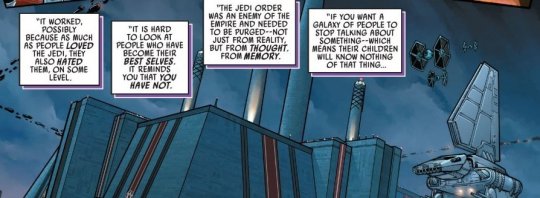
The senator cannot fathom the idea that a group of people could become their best selves, he doesn't believe that it's possible, because he has not achieved it, and so seeing it in others unsettles him. And, yeah, that's a whole thing that happens with the Jedi in Star Wars, so this speech made a whole lot of sense to me, especially combined with, "So the answer is more bogging them down in political oversight that does not bother to or even want to understand them?" Like, yeah, I see where you're coming from, sir. And that's not even touching the idea of calling the Buddhist-inspired religion (which the Jedi explicitly are) a "cult", because anyone who unironically says that should not be trusted.
723 notes
·
View notes
Text
Why Jews Aren't "Trying to Trick G-d"
(Note only secondary sources are cited in the bibliography)
For my second post I had originally planned on writing something more fun but unfortunately, I feel the need to write this. Lately I’ve seen quite a few people on twitter saying that the way Jews interpret Halakah is that Jews are trying to trick G-d. While this is obviously a bad faith argument designed to be shitty, I still think this subject should be explained in greater detail. Mostly because I think there’s a fundamental disconnect in the way people imagine religions should interact with their deity and how Judaism has historically interacted with G-d. Furthermore, due to the Haskalah and Counter Haskalah I feel that a lot of these ideas have been lost to a lot of Jews in the English-speaking world. Replaced by Platonism that has much more in common with Philo and Maimonides then it does with anything the sages actually wrote or believed. Or to put it in much franker terms the toilet demon Rabba Bar Rav Huna mentioned in Gittin70:A6 probably wasn’t a metaphor. Instead, it seems incredibly likely that both he and Rabbi Tanhum Bar Tanilai believed in a literal Sheyd that lived in literal toilets no matter how embarrassing that sounds.
The reason this bizarre tangent is important is because if you actually look at the biblical, rabbinic, medieval, kabbalistic, and hasidic literature it utterly destroys the idea that the relationship of the Jew to G-d is of one sided kowtowing submission. Granted, it’s quite easy to interpret it that way but that’s mostly due to conditioning in terms of what people think a theistic religion should be about rather than any wiggle room in the texts themselves. In fact, I’d wager most arguments against this have more to do with people’s idea of the Tanakh than the Tanakh itself.
The biggest reason for this misunderstanding in my opinion is that very few people actually know what a covenant is let alone its context. To illustrate my point, I’d like you to think back on the last time you made a covenant with someone or something. Assuming you aren’t a ceremonial magician the answer to the question just posed is probably never. In the modern world covenant has become almost solely associated with the Bible and has almost no context. Especially because the idea of the ‘New Covenant’ talked about in the works of Paul the Apostle has very little to do with what covenants historically were. Rather than statements of blind faith, covenants in the Ancient Near East were more analogous to contracts and treaties. There are even some scholars who think that the covenantal theology in Deuteronomy may be based on Ancient Near Eastern vassal treaties. (1)
In these treaties a bigger state or kingdom would make a treaty for a smaller kingdom to accept fealty to them. (1) In these treaties, at least in paper, rather than being a slave the ruler of the smaller nation was supposed to be a junior partner. Said vassals would also continue to be junior partners to the larger power if they held up the obligations given to them by the treaty. (1) Similarly, just as the smaller party holds obligations to the larger party the larger party also holds obligations to the smaller party. Including ostensibly having to listen to complaints or suggestions the smaller party made.
In the Tanakh or Five Books of Moses, there are exactly three covenants mentioned that occurred between G-d and humans. These three aforementioned covenants are the covenant with Noah and his descendants once the Ark lands, (Gen 8:20-9:13), The covenant for Abraham’s descendants where an unknown light phenomenon signifying G-d passes through Abraham’s sacrifice (Gen: 15), and the famous covenant between G-d and the Israelites on Mount Sinai (Exodus 19-24). Shortly after the establishment of both the Abrahamic and Mosaic Covenants G-d or an emissary of G-d appears and holds a banquet with the covenant members (Gen 18:1-10, Exodus 24:9-18). In the Ancient Near Eastern context that these texts were written in, banquets and feasts thrown by a king or senior covenant partner were incredibly important tools for control or consolidation. In both the Neo-Assyrian Empire and in the kingdom of Mari not only eating with the king but being at the table with him showed that you were considered as part of the king’s metaphorical family (2). These constructed family hierarchies would be clearly delineated by how close one sat to the king and how one sat, with the people right next to the king being seen as close immediate family members analogous to sons or younger brothers. In the two previously mentioned covenants the Elders of Israel and Abraham’s family sans Lot were sitting with G-d or his emissary suggesting an incredibly close relationship instead of merely that of master and servant. Especially as the angels or heavenly host were not seated ahead of the human participants at the metaphorical dinner table.
This idea of man as junior partner and consultant is also seen in the way that humans can critique, give advice to, or argue with G-d and G-d takes their words into consideration. A famous example of this post covenant is Abraham giving G-d suggestions on what to do with Sodom and Gomorrah and G-d accepting his input (Gen 18). An even more extreme example is in Exodus 32 when Moses actually argues with G-d and seemingly wins the argument thus saving the lives of the Hebrews. Similarly, complaints were by no means unknown by the rulers of vassal states to their overlords. The famous Amarna letters addressed by Egyptian allies and vassals to Pharaoh Akhenaten are filled with complaints and requests, with a few even being acknowledged (3). Considering that Pharaoh’s considered themselves living gods this just adds more background to the precedent of complaining towards, making suggestions to, or arguing with the divine.
Beyond the kinship of all the community of Israel, and not just a singular son, with G-d there are also many notions that have to be cleared up in regard to humankind’s place in creation. A famous Midrash Tanhuma Tarzia 5 has a Roman Consul asking Rabbi Akiba why Jews circumcise male children when G-d has them born uncircumcised. In response Rabbi Akiba shows the consul grain, created by G-d and bread which is that same grain altered by man. Rabbi Akiba then asks the consul which one is better, before giving the obvious answer that most people prefer bread. This little story besides giving a philosophical explanation for circumcision also gives a good summary of the main ethos of Rabbinic Judaism. That G-d made the world unfinished so that mankind in general and Jews in particular could finish it. To establish the kingdom of heaven on earth rather than merely waiting for it. The translation of ‘Tikkun Olam’ as repairing the world was meant to be understood literally and not just as a metaphor for social justice.
Lastly and perhaps most shocking to an Abrahamic Gentile reader, the G-d of Judaism was not traditionally portrayed as unchanging or infallible. The idea only gained traction in rabbinic Judaism after Maimonides inserted it into his theology after borrowing it from Aristotelian, Islamic, and Christian ideas in the 12th century. Historically the G-d of Judaism has been shown to change their mind, and according to Moshe Idel is even affected by theurgy (4). As evidenced by many stories in the Torah where G-d explicitly changes their mind on what they want to do. The mutability of G-d’s mind in terms of human prayer and action carries over to the realm of Halakhic interpretation assuming the other party has a good point. The most famous example of this rabbinical overturning G-d’s decree is in Baba Metzia 59B where Three Rabbis tell G-d that G-d and Rabbi Eliezer’s interpretation of a ruling regarding an oven is invalid. They achieve this by citing Deuteronomy 30:12, and Exodus 30:2 stating that the Law is not in heaven and is for the majority to decide its correct meaning. Instead of smiting the group of Rabbis G-d simply laughs stating that ‘My children have beaten me’. Indeed, the Great Maggid even goes as far as to say that G-d, like a parent teaching their child Torah, actually prefers a novel interpretation instead of just parroting the interpretation given by the parent (5).
In Pauline Christianity Deuteronomy 30:12 which states, “The Law is not in Heaven” has been taken to mean that Halakah isn’t binding in the kingdom of heaven. However, the mainstream rabbinic interpretation means that only living humans can truly follow the Torah and perform Mitzvot to their fullest extent. In the Talmud in Shabbat 88B there is one of many Moses vs angels battles found throughout Jewish literature regarding whether humans should receive the Torah. Just like all of the other stories with this mytheme, Moses obviously wins this battle and takes the Torah to Israel. What makes this story different is that rather than using theurgy to bind the angels or just beating the tar out of them, Moses defeats them with a well-reasoned argument. I’ll let the passage I copied from Sefaria speak for itself.
Moses said before Him: Master of the Universe, the Torah that You are giving me, what is written in it? God said to him: “I am the Lord your God Who brought you out of Egypt from the house of bondage” (Exodus 20:2). Moses said to the angels: Did you descend to Egypt? Were you enslaved to Pharaoh? Why should the Torah be yours? Again Moses asked: What else is written in it? God said to him: “You shall have no other gods before Me” (Exodus 20:3). Moses said to the angels: Do you dwell among the nations who worship idols that you require this special warning? Again Moses asked: What else is written in it? The Holy One, Blessed be He, said to him: “Remember the Shabbat day to sanctify it” (Exodus 20:8). Moses asked the angels: Do you perform labor that you require rest from it? Again Moses asked: What else is written in it? “Do not take the name of the Lord your God in vain” (Exodus 20:7), meaning that it is prohibited to swear falsely. Moses asked the angels: Do you conduct business with one another that may lead you to swear falsely? Again Moses asked: What else is written in it? The Holy One, Blessed be He, said to him: “Honor your father and your mother” (Exodus 20:12). Moses asked the angels: Do you have a father or a mother that would render the commandment to honor them relevant to you? Again Moses asked: What else is written in it? God said to him: “You shall not murder, you shall not commit adultery, you shall not steal” (Exodus 20:13) Moses asked the angels: Is there jealousy among you, or is there an evil inclination within you that would render these commandments relevant?
-Shabbat 88B (Babylonian Talmud)
The Mitzvot, something occasionally seen as higher and holier than the immanent aspect of G-d (6) were meant to be performed solely by humans. Because just like the angels, G-d lacks many of these physical imperfections that give many of the Mitzvot any real weight. Therefore, as the ones who do the most mitzvot, how we interpret and follow them is fundamentally up to us.
Admittedly I could go on and on about the theoretical frameworks behind the ideas. Such as the status of the Torah vis a vis the status of G-d, or the tradition of prayer as legal battle with the divine realm but that’d be a whole other bag of cats. One that’d probably take 20 pages to accurately give my thoughts, thoughts that would be at best heretical to at least a fair number of Jews. So instead let us end this here, there is no way for Jews to cheat Halakhah because it fundamentally belongs to the Jews. It is our burden that we have to bear and our most cherished treasure. Even if it did indeed come from G-d, like any gift the receiver usually is the actual owner and the one who decides what to do with it.
Citation List for non primary sources
Koller, Aaron. “Deuteronomy and Hittite Treaties.” Bible Interpretations , September 2014. https://bibleinterp.arizona.edu/articles/2014/09/kol388003.
Milano, Lucio. “Naptan Ḫudûtu Aškun". Practice and Ideology of Neo-Assyrian Banquets.” Thesis, Storia Antica e Arceologico Ciclo , 2013.Section 3. Eating With The King: The Earthly Banquet. PG 60-80
Nutter, Nick. “How the Great Kings Managed Their Vassal States during the Bronze Age.” nuttersworld.com, August 15, 2024. https://nuttersworld.com/civilisations-that-collapsed/managing-vassal-states/.
Idel, Moshe. Middot: On the emergence of Kabbalistic Theosophies. Brooklyn, NY: KTAV Publishing House, 2021.
Idel, Moshe. “The Son of God as a Righteous in Hasidism .” Chapter. In Ben: Sonship and Jewish Mysticism, 531–85. New York, NY: Continuum , n.d.
6. Idel, Moshe. “The World Absorbing Text.” Chapter. In Absorbing Perfections Kabbalah and Interpretation, 26–45. New Haven, Connecticut : Yale University Press, 2002
145 notes
·
View notes
Text
Reading a Ghost Story: Kim Soleum vs. Baek Saheon
there seems to be a consensus that there’s somebody "right" in this freak-off and it's KSE (the "right or wrong" argument starting all the way from what the "correct" solution to abyss transpo was, to just. [gestures] their current beef). i personally think "right or wrong" is a bad framework here. they're fundamentally just different kinds of ghost story readers-- not even in a "one misunderstands, one understands" way, they just aim to get different things out of the text. we see this again and again but it's particularly encapsulated in where the feud started: abyss transpo
KSE taunting BSH in the subway
strangely... there are a lot of different interpretations on what happened? so i'm going to say the interpretation i think is the most compliant with the text
KSE intends on making BSH regret assaulting someone out of the concern that only one lost item was eligible. whether this concern was justified is irrelevant. this is the rationale behind KSE showing BSH the disembodied female eye
off the bat, BSH misinterprets this. instead of feeling regret for assaulting someone, he regrets sacrificing his own eye when there was a perfectly disembodied one that KSE knew about. this is a false assumption, because the disembodied eye didn't fit the criteria
now: was BSH's original concern justified?
the announcement says, "There is a lost item. If you've found the lost item, please disembark at the next station and hand it over to the station staff." KSE makes his later remarks based on the nature of a "lost item"- and BSH uses that approach too! after a person loses their hat and gets it returned to them, do they want a second identical hat? a "lost item" is no longer lost when it is returned for the first time. BSH's original concern is justified
a lot of horror puzzles require a kind of leap of faith (ex. "the 75% chance must be true, and the 25% chance false). KSE knows that the metaphorical 75% is canonically true im DER- he is only certain that he can definitely get off later because he is a cheater with meta knowledge. BSH is unable to be certain and unwilling to take a leap of faith about his own survival, so he (rationally and ruthlessly) takes care of it
Their feud
famously, this difference in abyss transpo kickstarts their legendary freak-off
Viper from DER canon thrives in daydream. he's suited for ghost stories- reading them, and surviving them. and in abyss transpo, KSE finds out that BSH is fundamentally Viper
this is why KSE is so unnerved by him!!
some people seem to think BSH is "stopped from being Viper by KSE's mind games"? but that's not true. BSH never loses his instinct to always go for the coldly rational solution (as GSGW goes on, every time KSE appears to bare his neck, BSH goes for it. despite--and even because of-- how KSE is seen as a threat)
interestingly, BSH (who isn't afraid of ghost stories) is more single-minded about survival than KSE (who is a HUGE COWARD, yet finds the time to worry about others)
KSE's feud with BSH stems from that. if someone were doing everything BSH did out of panic, KSE wouldn't be nearly as on-guard. but BSH doesn't need cowardice to do what he does
As ghost story readers
KSE's position within GSGW is "a good reader- one who understands ghost stories." so with their feud, does this mean that BSH is a bad reader?
again, BSH thrives in daydream, and he's good at nailing what it takes to survive. BSH is an equally valid reader- he simply lacks the evolutionary pressure (KSE's fear) to become the kind of reader that KSE is
BSH's nature means he (can afford to) embrace the ghost story at face value
KSE's cowardice does not allow him to do this- he doesn't share BSH's resilience (and ruthlessness). naturally, KSE takes a lesser-walked perspective on the ghost story. one where he makes textual analysis leaps of logic
it's important to note how KSE's knowledge of previous escape records/DER plays a crucial role in his reasoning. as stated previously for abyss transpo, concluding that "people who got off at colored stations were likely not wearing those colors" etc can only be done through knowing about other escape records. and sure, BSH could've chosen to skip this blatant escape opportunity like the rest of them-- tried to use the deeper nature of what a "destination" is, like KSE did
... but BSH would never throw away a blatant escape opportunity for himself
again, KSE and BSH have different priorities when reading ghost stories: mainly, "empathy" vs. "self-preservation." despite being a coward, KSE loses the "self-preservation" olympics. he places as much emphasis on others as he does on himself in terms of escaping alive and well. maybe even more, when considering what he does at the bureau (Looky Mart). and this empathy extends to the actual ghost story! KSE's evolving relationship with Braun can take up an entire post by itself
meanwhile, BSH is willing to pay the price of taking ghost stories at face value- any blatant escape opportunity will do, he lacks the standards that KSE's empathy gives him. whatever gets him out and alive
BSH was born to survive ghost stories, KSE was born to manipulate them
*end note: this is tangential, but it's funny how a lot of people interpret all of this as KSE being a good person. i mean he does good things certainly. and he's a "better person" than BSH is. but... wow KSE's sense of morality can be its own post
#ghost story gotta work#kim soleum#baek saheon#gsgw#<- sigh i wanted to use this as my fandom tag but i got too far deep into#ghost story#<- being my tag
88 notes
·
View notes
Note
I’m curious why you think the last 10 minutes were especially bad. Maybe I’m misunderstanding but I thought Vax wasn’t released from his duty, he can just do it on Exandria, now, so he doesn’t have to serve his god by abandoning his family.
I find the framing of "Vax abandoned his family" to be fundamentally a gross misunderstanding of the narrative at best and utterly moronic at worst and always have since first finishing Campaign 1 in mid-2018.
If I had to sum up maybe the biggest problem in a LOT of Tumblr discourse, fandom and political, it is not understanding this: people make choices. Sometimes those choices have consequences that affect others; sometimes those choices affect others in a negative way. Sometimes that is the intent of that choice; sometimes it is simply a side-effect. Your feelings about being affected are always valid, and you can make your own choices based in those feelings, but your assumptions re: intent may not be. I find that Campaign 3, and its fans, and by extension the above conception of Vax, invariably extended nothing but bad faith at anything that made their blorbos feel a little bad for even a second and took it as personal attack rather than side effect, and I do not respect the opinions nor analysis of a single one of the people who did that.
#cr spoilers#answered#anonymous#this is also pertinent to veilguard city choice discussion while we're at it
109 notes
·
View notes
Note
I really enjoyed Allirontalks total deconstruction of Joseph Anderson's The Witness video that immediately made me understand why The Witness really walks the walk, where the base broke anyway, and the kind of philosophy it bumps up against. A lot of criticism I hear seems like a regurgitation of his unbelievably bad-faith experience he had with it so it's fun to see someone explain that
Okay, I had some issues with Anderson's video too, but this response is anemic, I'm having trouble getting through it. The assertion that Joe doesn't like puzzle games or being challenged is very unfair and inaccurate. When he says he found the theatre videos to be drawn out and unwelcome she just insists that they're optional, when like, I'd argue that they're extremely essential, and Joe didn't play himself by trying to give the game's philosophical content a good faith effort even if it left him cold. She makes fun of him for not understanding the shipwreck puzzle and then fails to accurately explain it herself??
She fundamentally misunderstands many of the points that Anderson makes in a way that feels like she just didn't give herself to them. When Joe says "I got this quickly, but I can imagine someone missing this and not being able to reason through it, which is why I'm so conflicted." She responds "Well, he complains when he doesn't get it quickly, AND he explains it when he gets it quickly, hypocrite much??" which is a baffling level of missing the point. The repeated comments at the fact that Joseph links his novels in the descriptions of his videos are also just, cruel? She references Dan Olson's video on Doug Walker and The Wall, and it feels like she wants Joe to be her Doug, but he's just not? Idk, he's not stupid, imo.
She's right that he misrepresents Rupert Spira, and she's right that Joseph is overall extremely closed minded regarding art that is abstract or subjective or asks you to bring some of yourself to it, but her repeated attempts to turn Joe into her Doug is just asinine and horrible to sit through.
164 notes
·
View notes
Note
Thanks for answering my anon. You made a free blocklist of people who liked your response which happens to be almost exclusively tme people. Maybe reflect on why that is and why you sidestepped the issue of the comic implying that having testicles makes someone a man
look, i’m gonna give you the benefit of the doubt and assume you’re not a troll and just someone who is upset. and in that case i have some things you might wanna consider.
first, you’re claiming transmisogny but the character you’re talking about is an established character. he’s a fem boy and his name is garret. this is not transmisogny. you’re just flat out wrong.
second, by assuming that he is trans fem when he is not, who is the one actually making judgements and assumptions about someone’s gender? and isn’t that a little transphobic? doesn’t that erase non-binary identities in the same way that you are claiming the comic perpetuates trans misogyny?
third, you’re clearly very bothered by this. enough to presumably block and unblock me to send me an ask on anon again. but why do you feel the need to make this about trans women when we as trans women have so much other real and pressing shit to deal with? have you considered that perhaps you are the one making yourself upset over this? have you considered giving this artist the benefit of the doubt and looking into the comic before you reach for your pitchfork? cause if you did, you would have very quickly discovered that there was nothing to be mad about in the first place.
and fourth and final, if you are upset about something that you misunderstood and took out of context the how does that make you any different from the people who try to invalidate trans people? the people who try to invalidate us do so because our existence threatens their worldview even though our existence has literally no impact on them and they are choosing to have rage over it. and isn’t that what you’re doing now? continuing to have rage over something that is based on your own misunderstanding?
isn’t being a trans woman difficult enough without us creating more problems for ourselves?
isn’t my experience of being a trans woman of color on the internet difficult enough without angry members of my own community engaging with me in bad faith?
i’m not gonna block you and my inbox is still open to you. i hope you take a second and look at yourself because right now, you are the one creating your own hell. and i wish that upon no one.
70 notes
·
View notes
Text
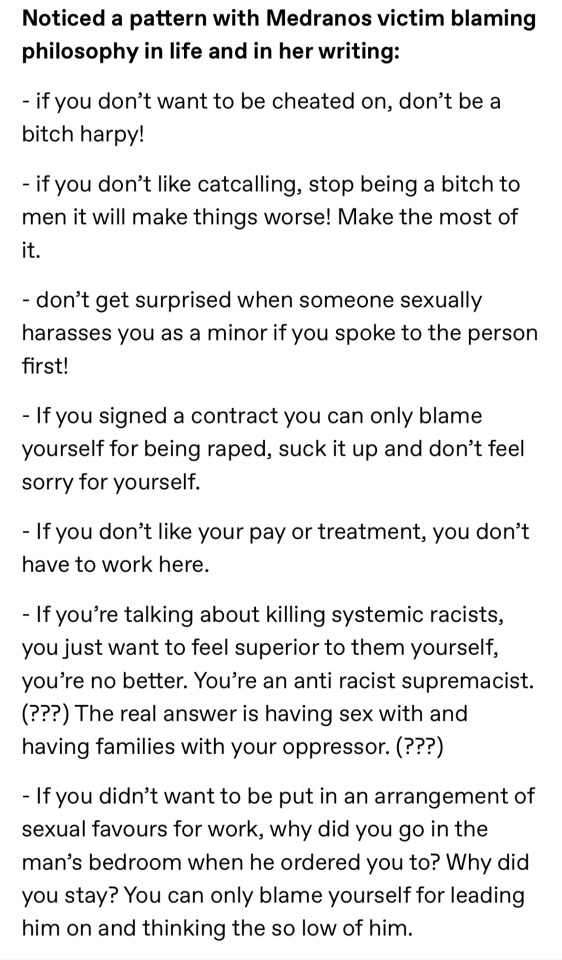
This critique is a cocktail of cherry-picking, bad-faith interpretations, and outright fabrication, so let’s shred it systematically.
1. “If you don’t want to be cheated on, don’t be a bitch harpy!”
This is clearly referring to Stella in Helluva Boss. Stella isn’t just a “bitch harpy”—she’s written as an abuser. Her portrayal as toxic isn’t about blaming her for Stolas’s infidelity; it’s about giving context for why their marriage is a wreck. Stolas cheating isn’t excused, and the show doesn’t portray him as morally clean. His guilt and struggles with his actions are major plot points.
Also, let’s not pretend that Helluva Boss endorses cheating—it shows the fallout of Stolas’s actions hurting everyone involved, including Octavia. If anything, it condemns cheating while exploring why imperfect people do it.
2. “If you don’t like catcalling, stop being a bitch to men it will make things worse!”
The argument that Vivziepop suggests women are responsible for harassment or catcalling because they’re “bitchy” to men is a gross distortion of her comments, and frankly, an intellectually lazy take. First, harassment is about the behavior of the harasser, not the victim’s response. No one should ever be blamed for unwanted attention, regardless of how they react to it. The idea that someone “asks for” harassment by not being pleasant or accommodating is not only outdated but dangerous. It perpetuates the toxic myth that women are somehow responsible for the actions of men, which is flat-out wrong. Viv’s comments, poorly worded as they may have been, don’t excuse catcalling or harassment—they’re being misrepresented as an attempt to justify it, which is an unfair oversimplification. Harassment is never the victim’s fault, and trying to shift blame onto women for how they handle unwanted attention only further enables the very behavior that should be condemned.
3. “Don’t get surprised when someone sexually harasses you as a minor if you spoke to the person first!”
The argument that Vivziepop somehow implies victims of sexual harassment—particularly minors—are to blame for their own abuse simply because they engaged with the perpetrator is a gross misinterpretation of both the context and her statements. While Viv was criticized for her responses to certain fan interactions, suggesting that she condoned or excused harassment based on the victim’s actions is both misleading and harmful. Viv’s comments were likely poorly phrased and taken out of context, but they do not justify blaming victims for being harassed, especially minors who should never be held responsible for the inappropriate actions of others. Sexual harassment is about the perpetrator’s behavior, not the victim’s engagement. To reduce a complex and sensitive issue to victim-blaming rhetoric not only ignores the actual power dynamics at play but also undermines the real harm caused by harassment. Vivziepop has clarified her stance over time, and this argument against her is based on a misunderstanding of her intentions, not an accurate reflection of her views on harassment.
4. “If you signed a contract you can only blame yourself for being raped, suck it up and don’t feel sorry for yourself.”
This is a Hazbin Hotel reference to Angel Dust’s storyline. Let’s be clear: Angel Dust is a victim of exploitation and sexual abuse, and the show portrays it as tragic. The power dynamics between Angel and Valentino are explicitly shown to be abusive. The narrative doesn’t blame Angel Dust—it focuses on his struggles to regain agency and dignity. This take reeks of someone deliberately misreading the material to fit their smear campaign.
5. “If you don’t like your pay or treatment, you don’t have to work here.”
Mischaracterizing Vivziepop as someone who tells her employees to just “leave” if they don’t like their pay or treatment is not only dishonest, but also ignores the fact that these critiques are usually based on a few bad-faith interpretations of online exchanges. Vivienne has addressed complaints about the work environment and compensation in her projects multiple times, and while her responses may not have always been perfect, reducing her stance to “just quit if you don’t like it” is an oversimplified, lazy take. This kind of narrative conveniently ignores her efforts to build her shows and team from the ground up, often under tight budgetary constraints, and ignores the nuances of creative labor in independent spaces. Criticizing her for not offering a “one-size-fits-all” solution only proves you’re more interested in tearing her down than actually engaging with the full context.
6. “If you’re talking about killing systemic racists, you just want to feel superior to them yourself.”
The claim that Striker is vilified simply for fighting against the system misses the point entirely. Striker isn’t vilified because he opposes the upper class—he’s vilified because he’s a hypocrite who uses that opposition as an excuse for violence and self-interest. His actions aren’t about dismantling systemic injustice; he’s just trying to replace one form of power with his own. The show doesn’t portray him as a victim of the system—it shows that his so-called fight for change is actually a power grab, and he’s willing to kill anyone who stands in his way. Striker is not being punished for opposing the system, but for being a selfish, violent character who manipulates his supposed cause for personal gain.
7. “The real answer is having sex with and having families with your oppressor.”
The relationship between Stolas and Blitz isn’t about endorsing romantic relationships with oppressors; it’s about the toxic, complicated nature of their connection. Yes, Stolas holds power over Blitz, but their dynamic is full of emotional manipulation, unhealthy dependencies, and broken people trying to navigate their flaws. It’s not about glorifying the power imbalance; it’s about showing how it leads to dysfunction. This take oversimplifies the relationship, ignoring the fact that both characters are victims of their own choices and circumstances. The show isn’t celebrating the power imbalance but highlighting how it’s destructive. Additionally, it explores the complexities of navigating differences between social classes and challenges societal expectations, illustrating that oppression is a systemic issue that affects groups, not just individuals. The characters are trying to figure out how to navigate that as individuals within those systems.
8. “If you didn’t want to be put in an arrangement of sexual favours for work, why did you go in the man’s bedroom?”
The idea that Helluva Boss is saying “if you didn’t want to be put in an arrangement of sexual favours, why did you go in the man’s bedroom?” completely misses the point. The show doesn’t condone Stolas’ manipulative behavior—it’s about showing how toxic their power imbalance is. In the episode “Full Moon,” Stolas recognizes how unfair the arrangement is and genuinely tries to make things right by offering Blitz more respect and autonomy. But due to miscommunication and emotional baggage, things blow up, and their relationship falls apart. It’s not about blaming Blitz—it’s about showing how both characters are trapped in unhealthy dynamics, and Stolas is actively trying to fix it.
In short: try again when you’ve actually watched the shows and done the bare minimum of engaging with their themes instead of concocting an edgy hate post for internet clout.
40 notes
·
View notes
Text
I wonder how Hazbin will treat religion, I wanted to talk about Morel Orel.
If you don't know, Is about Orel a kid how tries to follow the religious (fundamentalist Protestant Christian) teachings. But always takes it too far, and makes a mess. The series is really more rough and heavy that you would guess. I don't think is perfect, I hate episode 2 from season 1. But I really like how they treat the topic. If you are going to watch it, keep in mind: Season 1 is really unserious until the later. But it was done on purpose - the ending of the season it hits! Season 2 and 3 is really serious and heavier. -and takes its time to explore the characters and the problems going on in the town.
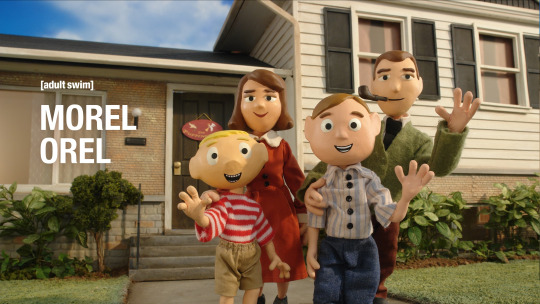
The end of the series pretty much resumes the point the series is trying to make about religion. During the hole series, the biggest problem is Clay (Orel's Dad) and how he is. In the series is the one, two tell Orel incorrect lessons based on religion and stuff. After all of that, the last episode shows Orel years later as a father. -And he is loving and the nice person he has always tried to be. You can see in the photo, he still is religious to despise everything. The problem really wasn't believing in god, but how people did bad things upon it.

Also, just to mention this scene! At the end of season 1, where things get serious. After many fights between his parents, Orel ignores them, misunderstanding the gravity of the situation. But by the ending of the episode he realizes the problem but yet he says; "But you still 2 minutes left, I got faith in you". He prays to God to fix the situation in the two minutes that he got left of Christmas. In complete silence, the camera goes away in to the sky. Orel waits for a response of God, but gets none......
I don't think Orel Morel is perfect, but I really like it, and it has a lot better writing that Helluva!
Hazbin is pretty different cause it takes place directly in hell and heaven. Instead of looking at the brainwashing as a critique or even the acknowledgment of religious people who are good? I really hope they don't fully fall into the Heaven is 100 percent bad and alt eat try for a gray moral. I wonder how they will treat all this stuff.
+one joke I liked in the series:
Orel does a little clay animation movie and shows it to people in town, but another kid presents it instead, who understand what's going on more than him. -and also accidentally showing many others that his dad beats him with a belt.
"Orel: Joe completely change the meaning of everything I wrote.... Doughy: Gosh Orel that too bad! Orel: Yeah, I guess certain things gets misinterpreted. Doughy: Like what? Orel: Hmm... not sure!" then he scratches his face, with the bible.
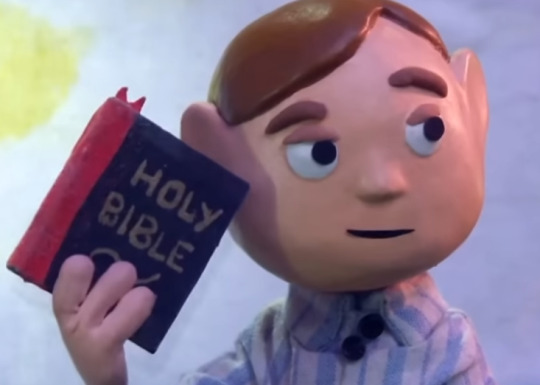
Hopefully it won't be that bad, right?
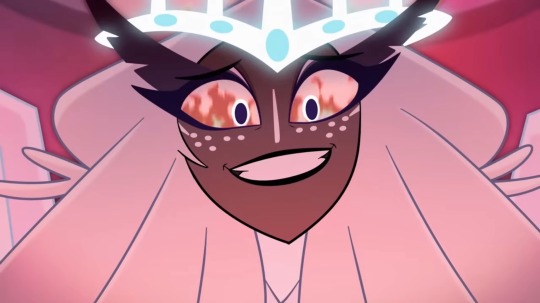
#vivziepop critique#vivziepop critical#helluva boss critique#helluva boss criticism#helluva boss critical#hazbin hotel critical#hazbin hotel criticism#hazbin hotel critique
206 notes
·
View notes
Text
The thing about Radqueer
I want to share my stance on Radqueer and the topics connected to it.
I believe that any identity that doesn’t cause harm is valid. This differs from the Radqueer stance of “good faith identities.” I don’t think it’s right to hate on Radqueers or transids because I genuinely believe most don’t intend to cause harm, but the reality is that some of the radqueers do with how they comunicate and name certain things and I’d like to explain how.
When it comes to concepts like "transabled," I don’t think feeling a disconnect between how you experience yourself and how you physically are is inherently bad, not at all.
However, the issue lies in labeling these experiences as "trans." People who identify as "transabled" often say they feel like they were supposed to be disabled. This is controversial because it can dismiss or trivialize the struggles disabled people face. I do believe there’s a way to describe and express these feelings without causing harm, but calling it “transabled” is not that way. I also believe that those who call themselves "transabled" experience some kind of struggles and should be supported to feel comfortable in non harmful ways.
Same goes for the concept of "transracial." There is nothing inherent in our identities that ties us to a specific ethnicity. Ethnicity is primarily based on physical characteristics, and when we place too much emphasis on these features, we risk perpetuating harmful stereotypes and racism. While it's important to acknowledge ethnic identities and the concept of race in order to combat racism and address historical inequalities, the idea of "transracial" suggests that ethnicity is a definite and personal identity in the same way that gender identity is. This isn't the case.
It’s absolutely okay to feel a connection to a culture outside of the one you grew up in. It’s also okay to wish you looked different or identify with aspects of a culture that isn't your own. However, these experiences should not be conflated with being "transracial." Being trans is about being a gender different from what you were assigned at birth, whereas ethnicity is tied to ancestral and cultural heritage, which cannot be different in the same way.
Beyond that, calling a feeling of wanting or believing you were meant to be something you are not “trans” is transphobic. Trans people don’t feel like they were “supposed” to be another gender, they ARE that gender. Many transid identities reduce conditions that aren’t social constructs to being solely identity-based, they are not.
I believe it’s fine to feel this kind of disconnection, and even dysphoria, and I don’t think we should police identities. However, it’s crucial to be mindful of how we name, communicate, and express certain identities, especially when they intersect with marginalized experiences.
I do believe that the feelings behind these identities are real. I support these feelings and identities, but I do not support the terms used in radqueer spaces to describe them. They misunderstand and misuse what being transgender is and dismiss the lived experiences of disabled people, racial minorities, and age-based struggles. Language matters, and using "trans-" in these contexts is both harmful and misleading. Being transgender is not about transitioning to something, being meant to be something, or relating to something, it is who you are.
I know that dysphoria can be more than gender dysphoria, I know things like age dysphoria exist and they definately are valid but having dysphoria is not the same as being trans, those are two different things. These feelings are valid, but the words used to describe them should not invalidate or appropriate marginalized identities. There are already alternative terms that avoid harm. For example, "Chronosian" describes the experience some "transage" individuals feel without misusing the term "trans." Finding new, respectful language is possible, and I think it’s an important step forward.
Another topic is being alterhuman or nonhuman. I fully support any alterhuman and nonhuman identities I myself am alterhuman, I know species dysphoria and phantom limbs are real as I do experience them myself. I don't think that alterhumanity itself is LGBTQIA+ but I do believe they belong to pride since I view pride as more than LGBTQIA+ pride but more on that later.
Now about paraphilias. As my username implies and my bio shows I am an anti-abuse paraphilic, I coined the term anti-abuse and it is linked here. Paraphilias are not something a person chooses, and simply having one does not make someone a bad person. However, what truly matters is how a person acts on their paraphilia.
For example, it is a wrong but widely spread stand that all pedophiles are monsters, which isn't true. They did not ask for or choose their attraction, what does matter is how they handle their attraction. It is never okay to engage with children on a sexual level because they don't understand the full meaning and consequences of sexuality plus adults have a certain power over kids which makes that an unhealthy power dynamic, either way: children can't consent. But many people with minor-related paraphilias hate themselves for their attraction, struggling with deep shame, depression, or even suicidal thoughts because on the one side they know that acting on their attraction would cause harm and on the other side society calling them predators and monsters for just having attraction they didn't ask for. I believe that, as a society, we should work on destigmatizing paraphilias themselves while maintaining clear boundaries that acting in ways that cause harm is unacceptable. People cannot control what they are attracted to, but they can control their actions.
Currently, the term "pedophilia" is often used as a catch-all for attraction to minors, but technically, it refers only to prepubescent children. Other terms like Infantophilia (attraction towards babies), Nepiophilia (attraction towards toddlers), hebephilia (attraction to early pubescent minors) and ephebophilia (attraction to mid-to-late adolescents) exist, but there isn't a widely used neutral term to describe all paraphilias related to minors. Because of this, I propose the term "minophilia" (I will maybe make a seperate post about it and if I did I will link it here) as an umbrella term to describe these attractions in a neutral way since the connotations of "MAP" can be seen as wanting to get rid of the paraphilia label or even glorifying attraction towards minors. Rather than doing that Paraphilias should be destigmatised and there should be a lot mor of education, we need to have open, informed discussions about these topics to prevent harm rather than driving people into isolation and self-hatred. Education and support for non-abusive individuals can reduce risks and help ensure that no one is harmed.
Paraphilias should not be included under LGBTQIA+, however they should be recognised as a marginalised group and do belong (under certain conditions) at pride in the same way as kink belongs at pride.
In conclusion, my stance is that we should focus on supporting people with non-harmful identities and attractions, while also making it clear that harmful behaviors, such as abusing or exploiting others, trivializing others struggles or misu´sing certain language in ways that cause harm, are never acceptable. Destigmatizing these topics and creating open, empathetic conversations is essential for promoting education, understanding, and mental well-being. Let’s work together to build a society that addresses these sensitive issues with care and responsibility, while ensuring the safety and dignity of all people. The "Radqueer" movement is not the answer. It is an attempt to talk about real experiences but does so in a way that causes mor harm than good.
I am open to any opinion and I will read all answers. I hope what I wrote is clear and doesn't offend anyone but rather gives a new perspective on how names and actions affect others.
#radqueer#transid#paraphilia#anti abuse paraphile#alterhumanity#anti-abuse#radqueer discourse#paraphilia discourse#transid discourse#anti radqueer
19 notes
·
View notes
Note
i would suck bleem off and ask for seconds. That said, he has a very deeply flawed understanding of religion based on being raised by hippies. I would love to argue with him for hours about his misunderstandings of religion and his bad faith and how he treats all religion like xtianity. I think there is some unfortunate implications in implying that the religious themes in d20 sucked because of Ally and not because Brennan and Ally both have some shit views on religion born out of emotional reactions. There's some misogynistic feeling to saying it's actually Ally's fault and Brennan was just going along with it. You do have a deep hero worship of him that I think is getting in the way of critically engaging with his views on religion, and that's why that anon is baiting you about BLeeM and religion, and it's not great that your response was to throw a queer person under the bus.
I edited it so it sounds a little less accusatory. What I meant was that the understanding he built how Helio was depicted around Ally is that it makes it much more understandable, because they have a specific irl history with Christianity that informs a lot of who they are and I don't begrudge them for that. I still noted that it was totally Brennan's input to have Bucky converting presented as something to hope for instead of setting him up to eventually evolve into a "good" Christian, but we'll probably see how that goes when we get to Senior Year in awhile.
I think Brennan's biggest problem in this area is a symptom of his praxis. He's okay with presenting Christianity in an always evil context in ways he'd never touch with other religions because he's a White American, and even if one was to point out religions like Islam or even Buddhism* are basically the same it still wouldn't be within his place to criticize them the same way. Which is fair enough, but it is a bit frustrating nonetheless. He could do more to acknowledge that there are queers who don't have Ally/Kristen's trajectory and stay in the church, or at least A church, or otherwise continue having some personal relationship to the religion in which they were raised. It's well and good to say Christianity oppresses non-Christians, but what about the queers still within? It has "let the red states burn, they voted for it" energy.
It also reminds me of his four and a half hour interview I've listened to three times now where he mentions someone calling him a slur for Irish people, and despite the fact that he was so very clearly uncomfortable with it he still tripped over himself to assure everyone he wasn't saying it was like, racism or anything. Like, Brennan, please, my guy, you were seriously disturbed, this hurt you in that moment, you were the victim of bigotry, you do not need the "haha no but I know I'm White" disclaimer. Please let yourself feel bigotried against.
*read Zen at War please it's so good
23 notes
·
View notes
Text
I’m sure you’ve seen pictures like this one over the internet in the form of memes, in self-declared manifestos and articles that claim to be from the queer community.
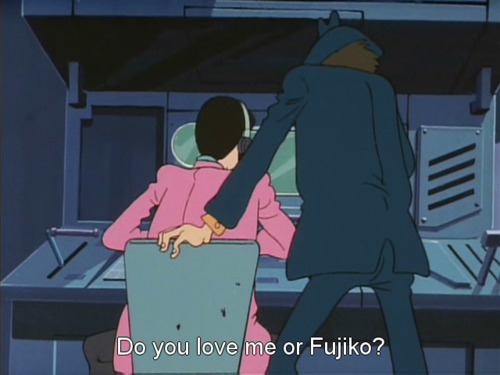
Looks like it’s Jigen asking Lupin, right? This does indeed get sold to the internet as if Jigen is asking Lupin such a big question.
The actual scene:
I posted a while ago an example of a very piss-poor translation of a chapter from the original manga that is used by the same people who write this so called propaganda as evidence of ‘gayness’ going on with these characters. You can read it here, TokyoPop simply made a poor job but that also is, apparently, taken seriously and spread all over the internet.
It all could be easily dismissed with a laugh because in the end the show itself is meant to be fun and being in the fandom should be fun but I keep asking myself if this fandom attitude qualifies as queerbaiting. What’s sad is that it comes from other fans who are... in good faith??? (color me suspicious) fooling people into believing things that are not there.
I’m sorry to have to say this but apparently there are some who actually trick people who are invested in certain characters and who might be fragile. People who, right because of this propaganda based on wrong translations, fake pictures, jokes being taken too seriously and too far and cultural misunderstandings, might end up deluded and hurt.
The list of these ‘misunderstandings’ or even misrepresentations can go quite on, here you get just the basic idea.
We’re all up in arms when queerbaiting comes from the powers that be authors and producers but when it comes from allegedly fellow fans is maybe even worse.
“Propaganda” in itself is already a bad word, if you need propaganda to convince people through memes plastered all over the internet that’s another sign that something is wrong. Not to mention most people only know the characters through the internet grapevine and therefore completely out of context, because by their own admission, they don’t even watch the show.
These characters have been around since the 60s, in Japan... I wouldn't even go near them being 'coded' because it could mean having to code them in a really bad way.
Feel free to share your view.
87 notes
·
View notes